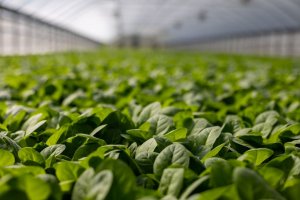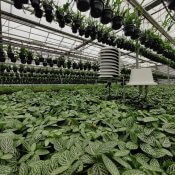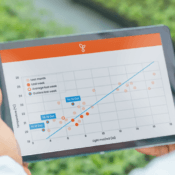Madestein’s Jonathan Zwinkels on integrating climate control with 30MHz
Since it was founded by two husband and wife teams in 1982, Madestein UK has earned its reputation as a leading supplier of Leafy Salads and Herbs across the United Kingdom. The company currently focuses on growing whole head lettuce (round lettuce, curly leaf lettuce, red butterhead lettuce) and fresh basil and the propagation of young lettuce plants— all under glass.
At the forefront of innovative growing techniques for greater sustainability, Madestein UK specialises in hydroponic cultivation and employs a holistic growing method known as Integrated Farm Management, which emphasises the use of data to optimise water efficiency, improve crop nutrition and energy usage, and naturally increase resistance to pest and disease— all aimed at lowering the environmental impact of cultivation while producing yields of the highest quality. The company produces greens destined for some of the best-recognised names in the United Kingdom, including Sainsbury’s, Marks and Spencer’s, Morrisons, Waitrose, Lidl and Tesco.
We checked in with Director Jonathan Zwinkels on his experiences with the 30MHz platform, and how it contributes to this holistic overview of his crops.
You were initially working with a climate control system, and then added and integrated the 30MHz platform. What did the 30MHz platform add to your crop monitoring?
We’re working with a Priva system to monitor on-site. What we’ve seen though, is that working with a climate control system is geared towards growers focused on one particular type of growing, and one particular type of crop. At Madestein, we grow crops in a different way and have different needs compared to high wire cropping. We needed to understand the various conditions of these crops to be able to steer them, and this was not possible using our existing equipment. We needed something that was flexible enough to look at a variety of metrics— dewpoint, VPD, microclimate. That’s where 30MHz came in, enabling us to really understand what each individual crop is doing, and to respond accordingly. Monitoring crops with the Pointed Microclimate Sensor, Madestein found that driving VPD higher improved the harvest quality and consistency, leading to a reduction in wastage and better shelf life.
With the 30MHz platform, I have the ability to get a quick overview of the glasshouse, whenever. I can check my dashboards right from my phone, and I don’t have to waste ten minutes logging into a PC.

Our experience of the 30MHz/Priva integration was that it was fairly low effort on our part. We didn’t have to do a huge amount— it was quick, efficient and remote. We’ve seen a variety of benefits from bringing these data sources together. We’re able to cross-reference data (ex: VPD of basil leaf, or stress points on lettuce). We’re able to graph the VPD data we get through 30MHz and understand it in the context of climate control, or ventilation positions. We can dig into the relationships between them, see the effects, and understand what needs to be changed to achieve our desired outcomes.
For example: we’ve received some high temperatures inland, and our lettuce was struggling as a result. We ended up utilising VPD as an indicator of plant activity and water stress. We’d amend different strategies, but it was this data that was giving us a clearer, objective picture of what we needed to do to reduce that stress.
How do you plan on working with this integration going forward?
We’re going to keep capturing data and working to understand more of the parameters that influence the crop. We’re working towards a greater understanding of what the crop is doing rather than what the climate around the crop is doing. We’re trying to figure out how we can steer the crop by looking at the crop, rather than trying to deduce that from how we assume the climate impacts the crop. Using the measurements directly from the crop gives us a stronger indication of whether we’re doing something right, we’re reading the crop rather than the climate.
Currently, we’re focusing on lighting programs, figuring out how to best monitor growth, when it’s time to switch from lighting to an unlit season, identifying which factors need to be taken into account— all depending on production profile. For us, it’s all about tying data back to those decisions.


30MHz is typing… Our extended support team is ready to chat!
At 30MHz we think it’s important that our users can use our platform in an optimal way. At times you may have questions and you would like some help from our support team. Email and our support page filled with helpful articles were your go to’s. But we thought it was time for something extra… ...Read more
New 30MHz connect casing: How we protect your tech
To make sure your dataflow is fully protected, 30MHz introduces a new connect casing: waterproof, dust proof and even resistant to hits. This special shield will last longer and ensure a reliable dataflow from the connected sensor. What does that full protection mean? That’s what we will explain in this article. Watertight: resistant to wetness ...Read more
Save energy with RTR
Greenhouse energy waste is invisible. Until the bill arrives. By then, you’re looking at heating costs higher than expected. Energy spend that doesn’t match what you’re getting in return. But energy waste doesn’t happen evenly. It happens in specific moments when temperature and light aren’t balanced. You might be heating when light levels don’t justify ...Read more


